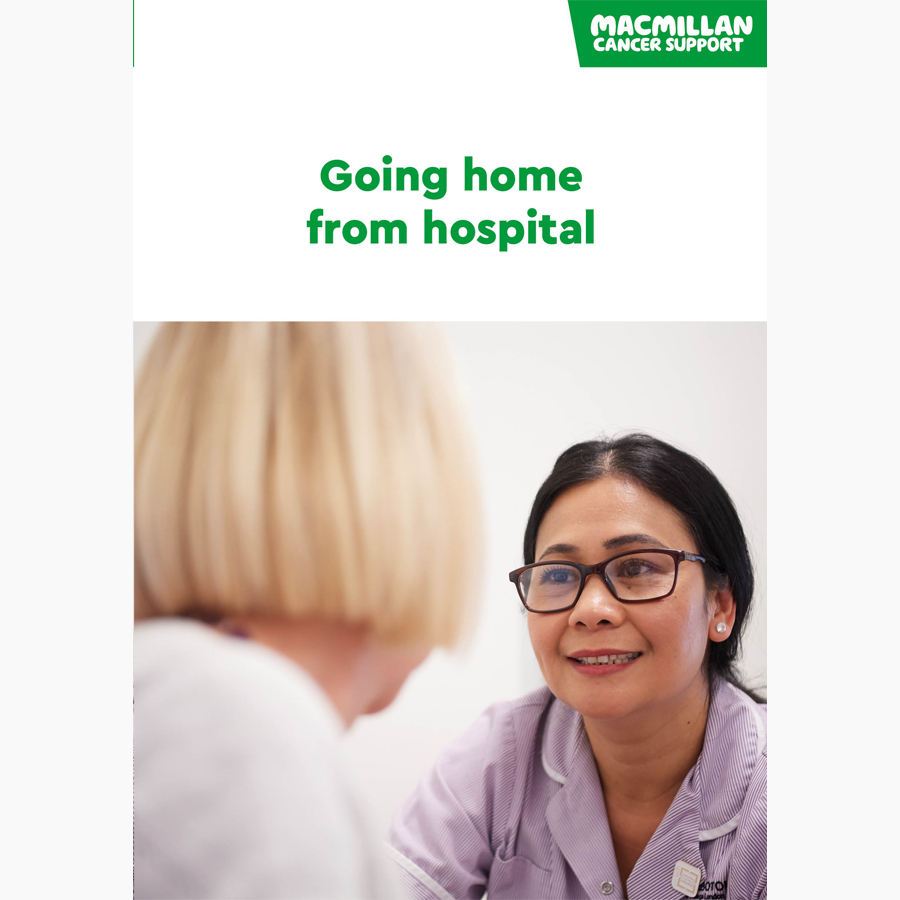Recovering from bowel cancer surgery
Find out what to expect in the days after surgery for bowel cancer and how to manage changes when you go home.
After your operation
Bowel cancer is a general term for cancer that starts in either the colon or rectum. It might sometimes be called colorectal cancer.
After surgery for bowel cancer, you will be encouraged to start moving around as soon as possible. Even if you have to stay in bed, it is important to do regular leg movements and deep-breathing exercises. A physiotherapist or nurse will explain these to you.
To reduce the risk of blood clots, you will wear compression or ant-embolic stockings. They reduce the risk of getting a blood clot in the legs.
Your nurse may also give you medication to prevent blood clots, as injections under the skin.
After your operation, a nurse will usually help you to get out of bed or to sit up for a short time. Gradually, you will be able to sit or stand up for longer, and to start walking around the ward.
We have more information about what happens after surgery.
Pain
It is normal to have some pain or discomfort for a few days after surgery. This can be controlled with painkillers. Immediately after your operation you may have painkillers in the following ways:
- By mouth (orally).
- As an injection.
- Through an epidural. This is a small, thin tube in your back that goes into the space around your spinal cord. It gives you continuous pain relief.
- Through a patient-controlled analgesia pump (PCA pump). The pump is attached to a fine tube (cannula) in a vein in your arm. You control the pump using a handset that you press when you need more of the painkiller.
- Through a thin tube called a rectus catheter that your surgeon places in your tummy. You may have this kind of catheter if you have the cut downwards from your belly button to your tummy.
- A combination of some of the above.
It is important to tell your doctor or nurse if the pain is not controlled. They can change your painkillers.
Painkillers sometimes slow down your bowel function (cause constipation). If your bowels are not moving, tell your nurses. They can give you medicines to help.
Before you can go home, your pain needs to be controlled by tablets. You will be given a prescription for painkillers you can take at home as needed.
Related pages
Feeling sick or being sick
A nurse will give you anti-sickness medication if you feel sick or are being sick. If this does not work, tell your nurse. They may give you a different type of anti-sickness medication.
We have more information about managing nausea and vomiting.
Drips and drains
You may be given fluids into a vein in your hand or arm. This is called a drip or intravenous infusion. Your nurse usually takes this out when you are able to eat and drink normally.
During bowel cancer surgery, you usually have a tube put in to drain urine (pee) from your bladder. This is called a catheter. A nurse will take this out when you are able to eat and drink normally and can walk to the toilet.
You may have a nasogastric tube. This is a tube that goes up the nose and down into the stomach. A nurse uses this to remove fluid from the stomach. Once the bowel starts working again, the nurse will take the tube out.
You may have a tube in your tummy, close to the wound. This drains fluid into a small drainage bag or bottle. A nurse will usually remove the drain after a few days.
Eating and drinking
You are usually able to eat and drink again soon after surgery. You may be given nutritional supplement drinks for a few days, to help your recovery.
Your doctor, nurse or dietitian can advise what to eat and drink as you get better.
Wound care
Wounds may be closed with stitches, clips or staples. A nurse at your GP surgery usually removes these after you go home. Sometimes a district nurse can come to your home to remove them. Some surgeons use dissolving stitches that do not need to be removed.
You may be given antibiotics to help prevent wound infection. It is important to tell your nurse or doctor straight away if your wound:
- becomes hot
- becomes painful
- bleeds
- leaks any fluids.
These can be signs that the wound is infected.
Possible complications
These can depend on the type of operation you had. The most common complications after surgery are:
- a wound infection
- bleeding in the area operated on
- a chest infection
- a blood clot
- a leak from the join in your bowel.
The nurses will monitor you for these complications. Tell them straight away if you:
- have any bleeding
- feel unwell
- have symptoms of an infection, such as a cough or feeling shivery
- have signs of a wound infection
- have swelling and redness in a limb.
If you have any problems when you get home, tell your doctor straight away.
Going home
Depending on the type of operation you have had, you will probably be ready to go home 2 to 7 days after surgery.
Before leaving hospital, you will be given an appointment for your post-surgery check-up. At the check-up, your doctor will talk to you about whether you need any further treatment – for example, chemotherapy or radiotherapy.
If you have stitches, clips or staples in your wound, these are usually taken out 7 to 10 days after the operation. A nurse at your GP surgery can do this. If you cannot leave home, a district nurse can visit you.
Booklets and resources
Stoma supplies
If you have a stoma, the hospital will give you some stoma supplies to take home. But you may also need to order stoma supplies from a pharmacy or specialist supplier. Your stoma care nurse can guide you through this process.
We have more information about about managing a stoma.
Bowel changes
Most people have changes in how their bowel works after surgery. Some people might develop bowel problems after a rectal cancer operation called a lower anterior resection.
It may take several weeks or months before your bowel function settles into a more regular pattern. You may need to make some changes to your diet to help you to manage these changes. Some people may need to take anti-diarrhoea medicines regularly.
Tell your doctor or nurse if you have bowel changes that are not improving or are difficult to manage.
We have more information about what you can do to help manage bowel changes.
About our information
This information has been written, revised and edited by Macmillan Cancer Support’s Cancer Information Development team. It has been reviewed by expert medical and health professionals and people living with cancer.
-
References
Below is a sample of the sources used in our bowel cancer information. If you would like more information about the sources we use, please contact us at
informationproductionteam@macmillan.org.uk
National Institute for Health and Care Excellent (NICE). Colorectal cancer. NICE guideline [NG151]. Updated December 2021. Available from: www.nice.org.uk/guidance/NG151 [accessed Jan 2023].
Cervantes A, Adam R, Rosello S, et al. Metastatic colorectal cancer: ESMO Clinical Practice Guideline for diagnosis, treatment and follow-up. Annals of Oncology. 2023;34(1):10-32. Available from: www.annalsofoncology.org [accessed Jan 2023].
Date reviewed

Our cancer information meets the PIF TICK quality mark.
This means it is easy to use, up-to-date and based on the latest evidence. Learn more about how we produce our information.
The language we use
We want everyone affected by cancer to feel our information is written for them.
We want our information to be as clear as possible. To do this, we try to:
- use plain English
- explain medical words
- use short sentences
- use illustrations to explain text
- structure the information clearly
- make sure important points are clear.
We use gender-inclusive language and talk to our readers as ‘you’ so that everyone feels included. Where clinically necessary we use the terms ‘men’ and ‘women’ or ‘male’ and ‘female’. For example, we do so when talking about parts of the body or mentioning statistics or research about who is affected.
You can read more about how we produce our information here.






